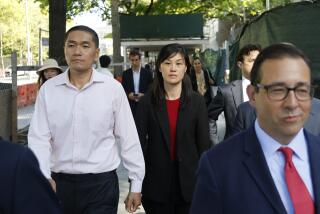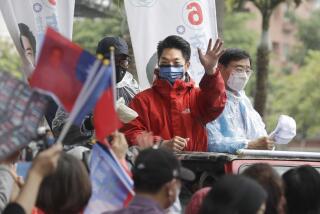Hu Took a Rural Path to Summit of Chinese Power
- Share via
DAKENGKOU VILLAGE, China — DAKENGKOU VILLAGE, China -- The most famous descendant of the Hu family has never visited the hall his ancestors built during the Ming Dynasty. But Fang Min has high hopes that the new leader of the world’s most populous country will come home soon.
“Maybe the timing hasn’t been right, but he’ll visit us after he becomes emperor,” said Fang, a staffer at the hall’s entrance.
The Chinese consider hometowns and family origins important in explaining someone’s personality and potential. Throughout much of the last decade, Hu Jintao has been an unknown, but to villagers here in Jixi county, Hu’s ascent to the post of Communist Party general secretary is a tribute to his political skills and his interesting family background.
Born in Shanghai, the 59-year-old vice president prefers to emphasize his family’s roots in this rural corner of Anhui province, less than an hour’s flight from China’s most cosmopolitan city. He rarely draws attention to his urban connection and has always written under family origins, Jixi Ren -- man from Jixi.
Jixi county is tucked into the foot of the famous Yellow Mountains in a region traditionally known as Huizhou. Its elegant and ornate architecture was the backdrop for the movie “Crouching Tiger, Hidden Dragon.”
The area has long been a cradle for ambitious scholars seeking their fortune in Beijing’s imperial courts. The dream of ascending the dragon throne too ran in the Hu family blood.
About 500 years ago, ancestor Hu Zongxian fought Japanese pirates who terrorized the Chinese coast. It pleased the emperor so much that he promoted him all the way up to defense minister.
When Hu Zongxian built the family’s ancestral hall, he chose a spot surrounded by mountains to symbolize a person sitting on a dragon’s chair. But in Chinese culture, only the emperor has that right.
Hu Zongxian displayed even more audacity by carving nine dragons on the door’s wooden pillar, albeit facing the inside courtyard for the viewing pleasure of fellow clan members.
“It’s actually 8 1/2 dragons,” said a guide here. “The ninth one is smaller than the rest, because only the emperor could display nine dragons.”
Hu Zongxian’s flagrant ambition eventually led to a humiliating death by the hands of a jealous rival.
Another emperor later rehabilitated the former hero. But the moral of the story lived on: Practice discretion to avoid political suicide.
That’s exactly what Hu Jintao did during his muted but meteoric rise from engineer to the inner sanctum of the Chinese Communist Party.
Hu remained so low-key that few Chinese know much about this well-hidden dragon. But a careful reading of his resume reveals a shrewd politician’s cautious and calculated ascent.
His predecessors, Mao Tse-tung and Deng Xiaoping, had revolutionary credentials as China’s founding fathers to legitimize their rule. President Jiang Zemin’s power base comes from urban Shanghai, China’s financial capital.
Educated in Beijing, Hu stayed away from the comfort of the big cities. Instead, he devoted most of his political career to the poorest regions of inland China. That experience set him apart from members of Beijing’s infamous Shanghai gang, who rose almost exclusively through the ranks of that wealthy coastal city. By choosing the inland path, Hu avoided becoming the target of resentment from cadres concerned about an unfair coastal-inland divide.
“He showed them that he was willing to take the hard jobs, to be tested, to show devotion and loyalty to the party,” said Cheng Li, a China expert at Hamilton College in New York state. “This can be a model to other mainland leaders, especially those who are not princelings.”
The oldest of three children, Hu grew up in coastal Jiangsu province’s Taizhou county, where his great-grandparents ran a prosperous tea business. By the time his schoolteacher father moved there in the 1940s from Shanghai to take over the family store, it couldn’t even afford hired help.
His father’s poor business skills proved to be a blessing. When the Communist government took over in 1949, it classified the senior Hu a mere shop owner. Had he been cast as a capitalist, it would have ruined his son’s chances of going to college and joining the Communist Party.
At the prestigious Qinghua University in Beijing, Hu picked hydroelectric engineering, a career that requires long stints in the most hardscrabble and far-flung corridors of rural China. He probably believed the son of a shop owner had more to prove than children of peasants or factory workers.
It turned out to be a career-saving move. A decade in the remote power stations of Gansu province shielded him from the life-and-death struggles of the Cultural Revolution, which destroyed the lives of many. It was also in this dirt poor remote province that he married his college sweetheart and fellow hydroelectric power major, Liu Yongqing. They have a son and a daughter.
The other important person in his life during that time was Song Ping, a party elder and Qinghua alumnus. Song saw in Hu the potential to make an even better politician.
Song helped him return to Beijing, where he established a beachhead as the youngest chief of the Communist Youth League. Then Hu returned to cut his political teeth in the Chinese heartland, first in Guizhou province, then in the Tibet Autonomous Region. Again, impeccable timing enabled him to escape the tumult of the 1989 Tiananmen Square massacre.
As party boss in Tibet at the time, Hu impressed Deng with his clean and decisive crackdown on pro-independence demonstrators there. It earned him a spot in 1992 as the youngest member of the powerful seven-person Politburo Standing Committee.
Today, Hu has taken his most important step in fulfilling his ancestor’s forsaken dream. But although he has become the youngest general secretary of the Communist Party, Hu still has to wait for Jiang to relinquish control of the military and the presidency to cement his hold on power.
The people in his ancestral village believe he will prevail by keeping his eye on the prize and checking his real ambitions.
“Hu makes a good figurehead,” said one villager who didn’t want to give his name. “He is nice and moderate, good for maintaining stability. Someone too strong will be smashed down.”
More to Read
Sign up for Essential California
The most important California stories and recommendations in your inbox every morning.
You may occasionally receive promotional content from the Los Angeles Times.










